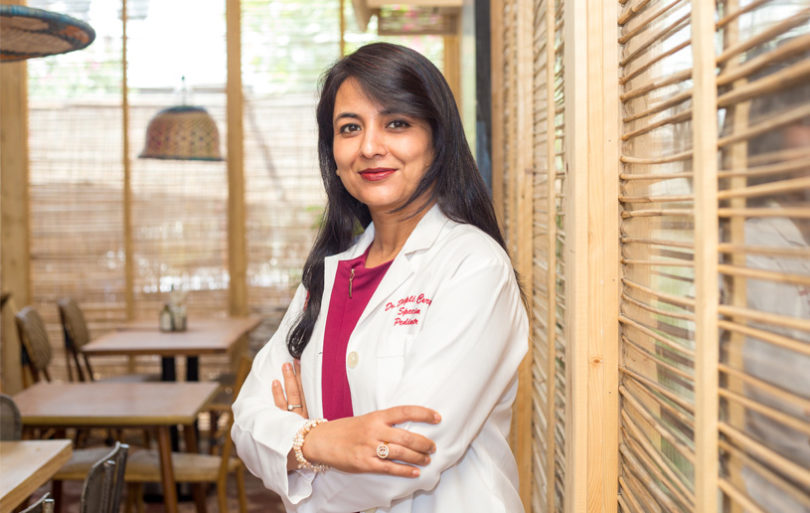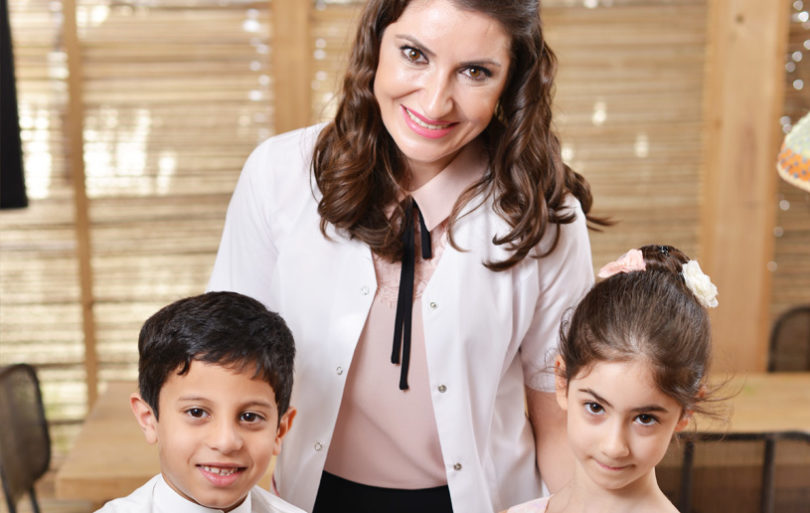The Parenting Guidebook
Very often, career and family life overlap. The overlap is more apparent when career addresses issues which are closely related to family life – and in the case of a mother and paediatrician this is quite evident. Mother, Baby & Child interviews Dr Deepti Chaturvedi, Specialist – Pediatrics at Burjeel Hospital Abu Dhabi, to answer the most common motherhood questions from a mother, who is also a doctor’s, perspective.

1. How do I know if my newborn is healthy?
- Newborn babies may cry for several hours a day. This is usually their way of telling you that they need something such as when they are hungry, tired, feel cold or hot, their diaper needs changing or need to be comforted.
- Generally, a healthy baby means an active and alert baby who is feeding well, sleeping well, and passing urine five-six times a day without any issues.
- It is advised to monitor your baby’s growth and development with a paediatrician every fortnight monthly for the first six months and quite regularly thereafter too.
- Any warning signs like lethargy, refusal to feed, a continuous high-pitched cry, fever, vomiting, abnormal behaviour or movements should be a reason to visit a paediatrician in between the regular visits.
- It is not unusual for newborns to experience irregular breathing. Sometimes, newborns stop breathing for five to ten seconds and then instantly begin breathing again on their own.
- At times, their eyes might be crossed because it is hard for them to focus but by two to three months, babies should have more control of their eye muscles and be able to focus better.
- Newborns can differentiate between sounds including voices. You should talk to your baby often to find out if your they turn towards the sound of your voice.
2. Are vaccines safe?
Vaccines are our best defence against infectious diseases. Children are given shots – namely vaccines – at a young age because this is when they are at the highest risk of getting sick or dying if they catch these diseases.
We recommend 13 highly important vaccinations to prevent infectious disease such as measles, mumps, rubella (German measles), varicella (chickenpox), hepatitis B, diphtheria, tetanus, pertussis (whooping cough), Haemophilus influenza type B (Hib), polio, influenza (flu), rotavirus, and pneumococcal disease.
3. How can I make sure my child is following a healthy diet?
Eating healthy at a young age can reap benefits for a lifetime. Therefore, good eating habits should be instilled at a young age.
Children need to follow a balanced diet to ensure the body absorbs all the right nutrients. A balanced diet contains food from the below categories:
- Protein. Choose seafood, lean meat and poultry, eggs, beans, peas, soy products and unsalted nuts and seeds
- Fruits. Encourage your child to eat a variety of fruits
- Vegetables. Provide a variety of vegetables such as dark leafy greens, red and orange ones, beans and peas, etc.
- Grains. Choose whole grains such as whole-wheat bread, oatmeal, popcorn, quinoa, or brown or wild rice. Limit refined grains
- Dairy. Encourage your child to eat and drink fat-free or low-fat dairy products, such as milk, yoghurt, cheese or fortified soy beverages
4. What is the best way to discipline my toddler?
Every toddler is different and the ways to deal with their behavioural issues will be different too. However, there are some strategic points which could help in turning the “terrible twos” into “awesome twos”.
- Be consistent: If same action by the toddler elicits different responses from parents at different points in time, it can be confusing for them to understand the difference between right and wrong.
- Keep it short and simple: Toddlers do not understand long instructions, so try to keep them short and simple enough for them to comprehend and follow.
- Know your child’s triggers: It could be hunger, lack of sleep, overactivity or simple boredom. Every temper tantrum has a pattern to its trigger; find it and try to avoid it as much as humanely possible.
- If all else fails, give them a “time out”. A time out should be given in accordance with the child’s age; do not forget to tell the child why he has been given one.
- Stay positive: Raising children is not an easy task and toddlerhood is as tricky as the teenage years. So, remember to stay positive throughout and avoid showing your anger. Remember, this too shall pass.
5. How can I get my child to sleep through the night?
There are many reasons as to why your baby might be awake during the night. They may need to be fed, comforted or might be teething which could also upset their sleep patterns. Babies require a consistent bedtime routine to help them settle easily.
You could try making daytime feeding more social and fun compared to nighttime feeding where the environment is more relaxed and calm. This will help your baby learn the difference between day and night.
Also, try to give your baby the chance to fall asleep on their own (natural circadian rhythms) often known as “sleep-wake cycle”, which helps regulate sleep. Babies up to four or five months old are less likely to be fed at night and are able to sleep for longer.
6. When should I start potty training?
Children are not usually ready to start using a potty until they are between 18 months to three years old. Boys tend to be ready a few months later than girls. Parents should start the training at the age of two to get them into the habit of going to the bathroom by themselves by the age of three.
Dr Cosmina Moldovanu knows mothers. Medical Aesthetician, Nutritionist and Slimming Specialist at the Dubai-based Cavallo Aesthetic Clinic, she deals with them on a daily basis in order to cater to even the most complex of health and beauty requests.
However, Cosmina knows it goes far beyond the skin pulling and fat melting; her area of expertise is about something much bigger than that – it is about confidence. It is about mothers wanting to love themselves and the way they look. Here, she tells Mother, Baby & Child what her job is – in reality – all about.

1) Why do you think it is often difficult for mummies to “love the skin they are in”?
After pregnancy, and even more so after giving birth, mothers find themselves focusing more on their family. They have no time to take care of themselves like they used to and – at the same time – their bodies are not what they used to be.
Accompanied with the lack of an active social life, many mummies find themselves spiralling down into depression, not knowing what to do with this new life they have been given. It is miraculous, but any mother can tell you, it is not easy.
2) What is the main issue you face at the clinic with mothers seeking treatment?
I face plenty of issues, but the most salient would be extra fat, loose skin, cellulite and stretch marks. Needless to say, these are always worsening due to an unhealthy lifestyle which patients tend to be following unless directed otherwise.
3) What do mothers complain about the most and how do you deal with it?
They complain about their bodies! This is a very sensitive job, but I do my best to use all of the technology we have been blessed with to make them happy and confident. I support them; what people may not know is that there is a psychological side to all of this, so we try to be there for them – they can come to me for all of their problems, be these physical, or psychological as a result of the former.
4) Tell us about the most moving story you have ever encountered.
This mother had come to me with so much “mummy guilt”, it was terrible. She had no self-confidence because she had gained so much weight after giving birth. The breaking point was when her husband had called her a “whale” and she had to seek an answer.
After working with her, first and foremost, towards a healthier lifestyle, incorporating sports and in parallel with slimming technology she lost 20 cm off her waist and became so happy you could see that the burden had been lifted.
5) What are your views on plastic surgery?
You often need plastic surgery, but before considering it make sure you have thought of the non-invasive alternatives. I think advanced plastic surgery in specific should be a last resort rather than first option.
6) What is your number one tip for mothers so they would feel confident and happy at all times?
Mothers must adopt a healthy lifestyle, always care about their bodies and love their bodies no matter what.
7) How can we take care of our bodies, especially post-pregnancy?
Things change after pregnancy, but nothing is irreversible. Always listen to what your body is trying to tell you, be aware of your portion sizes and the quality of food you eat, avoid fad diets and go easy on yourself.
8) Is it possible for mothers to get their bodies back after giving birth?
Yes, it is! Taking care of their bodies even more right before and during pregnancy will help them get back into shape easier after giving birth – so this is something to keep in mind.
9) What would you like to hear from your patients, specifically mothers, in the future?
I would love to hear them say that there are happy with their bodies. Yes, you can do it, just believe in this and yourself!











Comments